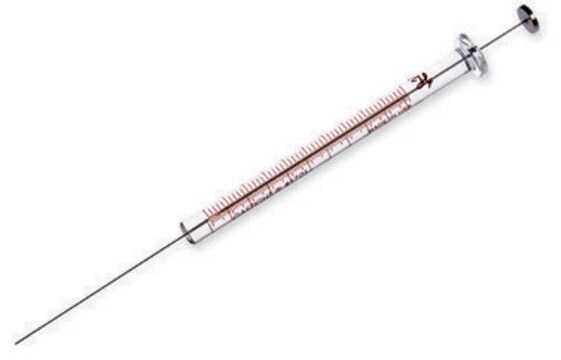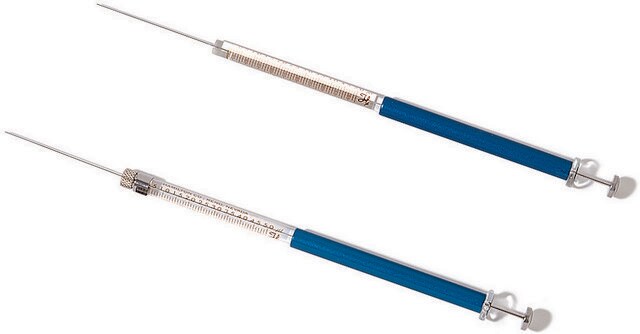24539
Hamilton® syringe, 700 series, removable needle
750RN, volume 0.5 mL, needle size 22 ga (bevel tip), needle L 51 mm (2 in.)
Synonim(y):
Hamilton® Syringe 750RN, 500UL
Zaloguj sięWyświetlanie cen organizacyjnych i kontraktowych
About This Item
Kod UNSPSC:
41122001
eCl@ss:
32070500
Polecane produkty
Materiały
stainless steel needle (point style 2)
rozmiar igły
22 ga (bevel tip)
Właściwości
needle type RN (removable needle)
point style 2
opakowanie
pkg of 1 ea
producent / nazwa handlowa
Hamilton 80830
dł. igły
51 mm (2 in.)
pojemność
0.5 mL
Szukasz podobnych produktów? Odwiedź Przewodnik dotyczący porównywania produktów
Opis ogólny
Hamilton syringe is available in gas-tight type that minimizes the gas exchange in GC analysis. It gives accurate volume delivery. The plunger is mostly unsurpassed.
Zastosowanie
It has been used during greenhouse testing done for evaluating transformed lines expressing FsTR1101 gene for resistance to the spread of Fusarium. It was also used in determining the bubble stability and for optical imaging of bubbles of Class II Hydrophobins from Trichoderma reesei.
Informacje prawne
Hamilton is a registered trademark of Hamilton Co.
This page may contain text that has been machine translated.
Wybierz jedną z najnowszych wersji:
Certyfikaty analizy (CoA)
Lot/Batch Number
Przepraszamy, ale COA dla tego produktu nie jest aktualnie dostępny online.
Proszę o kontakt, jeśli potrzebna jest pomoc Obsługa Klienta
Masz już ten produkt?
Dokumenty związane z niedawno zakupionymi produktami zostały zamieszczone w Bibliotece dokumentów.
Klienci oglądali również te produkty
Surface properties of class II hydrophobins from Trichoderma reesei and influence on bubble stability.
Cox, Andrew R., et al.
Langmuir, 23.15, 7995-8002 (2007)
Engineering deoxynivalenol metabolism in wheat through the expression of a fungal trichothecene acetyltransferase gene.
Okubara, Patricia, et al.
Tag. Theoretical and Applied Genetics. Theoretische Und Angewandte Genetik, 106.1, 74-83 (2002)
Don P. Wolf
In Vitro Fertilization and Embryo Transfer: A Manual of Basic Techniques, 06-Dec, 192-192 (2012)
Nasz zespół naukowców ma doświadczenie we wszystkich obszarach badań, w tym w naukach przyrodniczych, materiałoznawstwie, syntezie chemicznej, chromatografii, analityce i wielu innych dziedzinach.
Skontaktuj się z zespołem ds. pomocy technicznej









